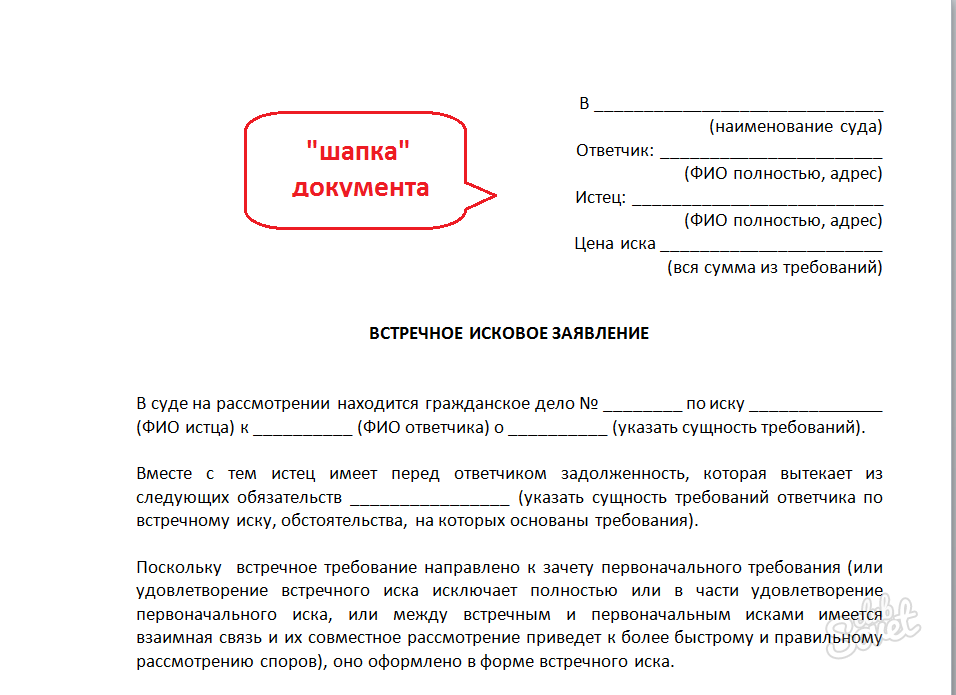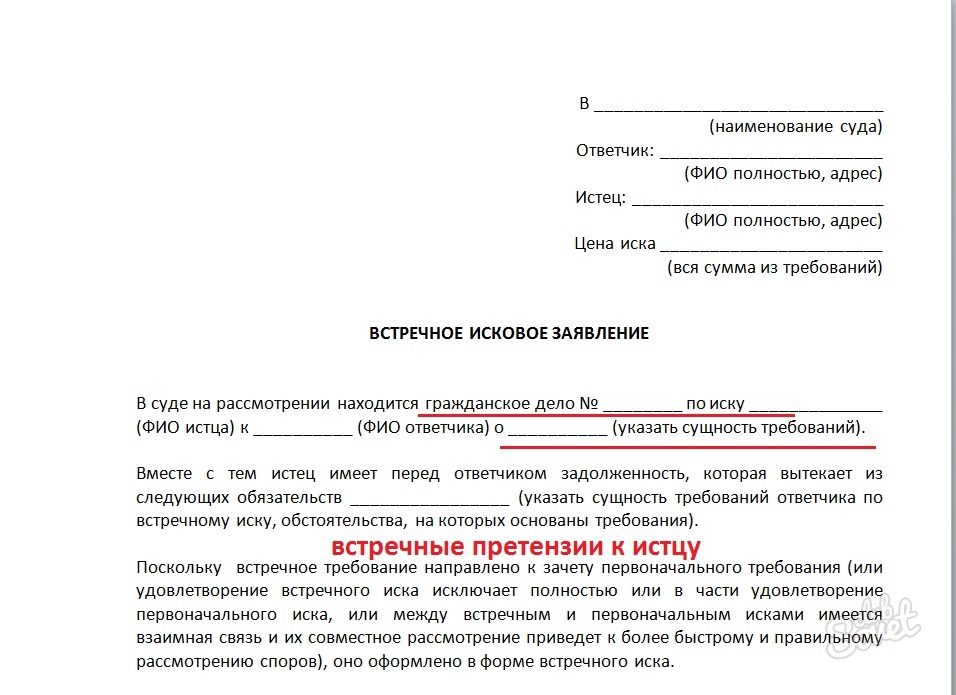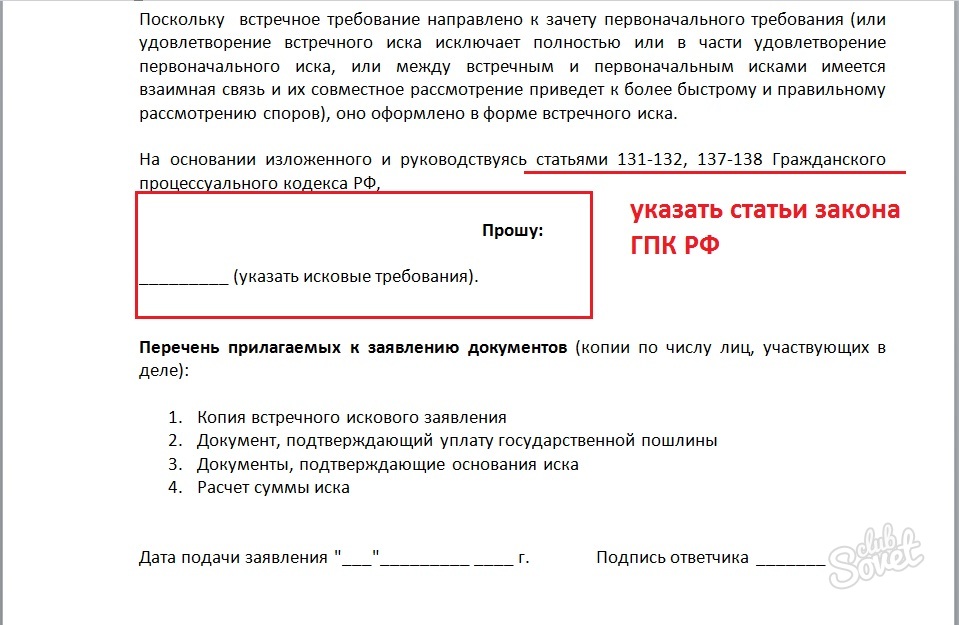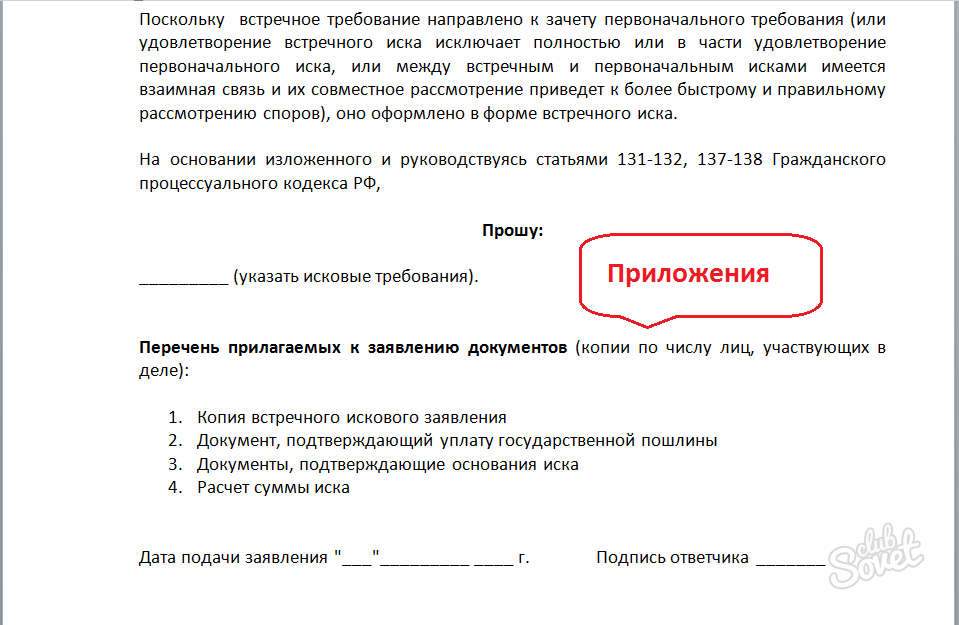The counterclaim is a statement of claim with an expression of response claims by the defendant to the plaintiff in case of initiation against him the court. The defendant has the right to an expression of his own opinion on the content of the civil procedure, the application is a means of protection. To properly formulate response, you need to familiarize yourself with the rules for issuing a counterclaim, the procedure for its presentation.
How to submit a counterclaim
Civilian acting in court as a defendant has the opportunity submit counter claim At any time of judicial proceedings, before the court will be made the final decision. Wherein elementary And the oncoming claims are considered in court at the same time. If the claim is submitted during the hearing of a civil case at the time of the announcement of the deliberative room, the court, given the emerging circumstances requiring additional investigation, should require a re-trial of the case - article 196 Part 2 Code of Civil Procedure of the Russian Federation. The best time to submit a counterclaim in the case - at the stage of its preparation, about which the defendant is warned by the court.
Adoption procedure
In order for the counterclaim to be adopted in court, you need to make sure of a number of conditions. They are clearly defined in article 138 Code of Civil Procedure of the Russian Federation:
- Counter requirements complement the basic statement of claimant.
- Both suitable claims are interrelated, in fact, their simultaneous consideration will serve as an acceleration of the trial.
- A positive decision that may be accepted by the court on a counterclaim, excludes the satisfaction of the claimant's claims in whole or in part.
If you have a violation of all the listed requirements, the judge makes a refusal to accept a counterclaim statement. This court decision is not subject to appeal according to Resolution No. 13 of 06/26/08 Plenum of the Armed Forces of the Russian Federation.
Registration of the counterclaim
The counterfront sample defendant receives in that court, where the statement of the plaintiff was received. He is explained by his rights, regulations and presenting a counterclaim. The rules are the same that they are provided for any suit, they are set out in art. 131 Code of Civil Procedure of the Russian Federation. The only difference lies in the fact that the requirements of the counterclaim should be aimed at repaying the requirements of the Basic Claim. The name of the court, the name and address of the defendant and the plaintiff, is written in the "cap".
Download on the site:
In the main part of the document, you must specify the number of civil affairs. Then describes in detail the essence of the requirements of the counterparty, in which, in his opinion, his rights and legitimate interests are violated. After that, the defendant describes what it is expressed by his disagreement with the claims submitted to him. Council claims must be reasonable.
In the final part of the counterclaim, after the word "I ask," the defendant sets out the request to take a positive decision on his claims to the plaintiff, based on the articles law of the Code of Civil Procedure of the Russian Federation.
Documents supporting his petition are listed in the application to the application. The list of documents includes: various references, receipts, a copy of the counterclaim, the receipt of the payment of state duty, the calculation of the amount of the claim. In the last line of the claim, the date of writing the application and the signature of the respondent is set.
Samples of countercading for download:
 On the credit of the initial requirement;
On the credit of the initial requirement; To eliminate obstacles to communication with the child;
To eliminate obstacles to communication with the child; To the Bank for Debt Reduction;
To the Bank for Debt Reduction; On the determination of the child's residence when divorced parents;
On the determination of the child's residence when divorced parents; About recovery of losses in case of missed benefits;
About recovery of losses in case of missed benefits; On recognition of ownership of an apartment.
On recognition of ownership of an apartment.
Foundation of the counterclaim
Most often, the presence of a claim is found at the following events:
- Declaration of the claimant from the defendant of debt arising from the recognition of the contract between them is invalid or not uncontucted.
- Termination of the contract with the claimment of the plaintiff to transfer it to the subject of the contract in a natural form or requirement of the execution of the terms of the contract.
- Recognition of the ownership of the respondent when submitting a claimant about providing him with some particular thing.

The court can satisfy fully claims one of the parties and refuse another. The situation is likely when you receive a failure and the main, and counterclaim, or their requirements are partially satisfied. Never make a decision in favor of the plaintiff and the defendant at the same time. In any case, both parties have the right to appeal the court's decision.




































